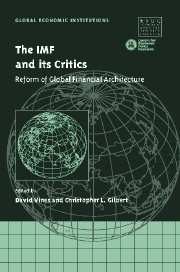Book contents
- Frontmatter
- Contents
- List of figures
- List of tables
- List of contributors
- Acknowledgements
- Introduction
- 1 The IMF and international financial architecture: solvency and liquidity
- 2 Progress towards greater international financial stability
- 3 International coordination of macroeconomic policies: still alive in the new millennium?
- 4 The Report of the International Financial Institution Advisory Commission: comments on the critics
- 5 Reforming the global financial architecture: just tinkering around the edges?
- 6 The IMF and capital account liberalisation
- 7 How should the IMF view capital controls?
- 8 The resolution of international financial crises: an alternative framework
- 9 Whose programme is it? Policy ownership and conditional lending
- 10 The IMF and East Asia: a changing regional financial architecture
- 11 The role of the IMF in developing countries
- 12 Argentina and the Fund: anatomy of a policy failure
- 13 Countries in payments' difficulties: what can the IMF do?
- 14 Accountability, governance and the reform of the IMF
- 15 The IMF at the start of the twenty-first century: what has been learned? On which values can we establish a humanised globalisation?
- Index
- References
14 - Accountability, governance and the reform of the IMF
Published online by Cambridge University Press: 04 December 2009
- Frontmatter
- Contents
- List of figures
- List of tables
- List of contributors
- Acknowledgements
- Introduction
- 1 The IMF and international financial architecture: solvency and liquidity
- 2 Progress towards greater international financial stability
- 3 International coordination of macroeconomic policies: still alive in the new millennium?
- 4 The Report of the International Financial Institution Advisory Commission: comments on the critics
- 5 Reforming the global financial architecture: just tinkering around the edges?
- 6 The IMF and capital account liberalisation
- 7 How should the IMF view capital controls?
- 8 The resolution of international financial crises: an alternative framework
- 9 Whose programme is it? Policy ownership and conditional lending
- 10 The IMF and East Asia: a changing regional financial architecture
- 11 The role of the IMF in developing countries
- 12 Argentina and the Fund: anatomy of a policy failure
- 13 Countries in payments' difficulties: what can the IMF do?
- 14 Accountability, governance and the reform of the IMF
- 15 The IMF at the start of the twenty-first century: what has been learned? On which values can we establish a humanised globalisation?
- Index
- References
Summary
Introduction
To be effective, the IMF and its activities must be transparent to the public, accountable to its members, and responsive to the lessons of experience and outside evaluation.
(G7 Communiqué, 15 April 2000)Over the 1990s, in an effort to improve both its effectiveness and its public image, the IMF began to take steps to make itself more transparent, more accountable and more participatory. This chapter investigates how accountable the institution has become and what ‘accountability’ might and should mean for an international institution such as the IMF. Curiously, although great strides have been made in improving transparency and in better understanding concepts of participation and ownership in the implementation of the institution's programmes, a rigorous definition and concept of ‘accountability’ has been slow to emerge. Indeed, most contemporary proposals for the reform of the institutions use the term regularly without ever developing who should be accountable to whom and for what.
Section 2 of the chapter discusses why accountability is now so prominently on the agenda and why the traditional structure of the IMF no longer meets expectations as to how accountable the institution should be. Section 3 examines the demands of new actors to hold the institution better to account, focusing in particular on the rise of non-governmental organisations (NGOs) and their engagement with the IMF. Section 4 critically examines the role of the United States in reforming the Fund and evaluates the recommendations of the Meltzer Commission.
- Type
- Chapter
- Information
- The IMF and its CriticsReform of Global Financial Architecture, pp. 396 - 416Publisher: Cambridge University PressPrint publication year: 2004
References
- 4
- Cited by

